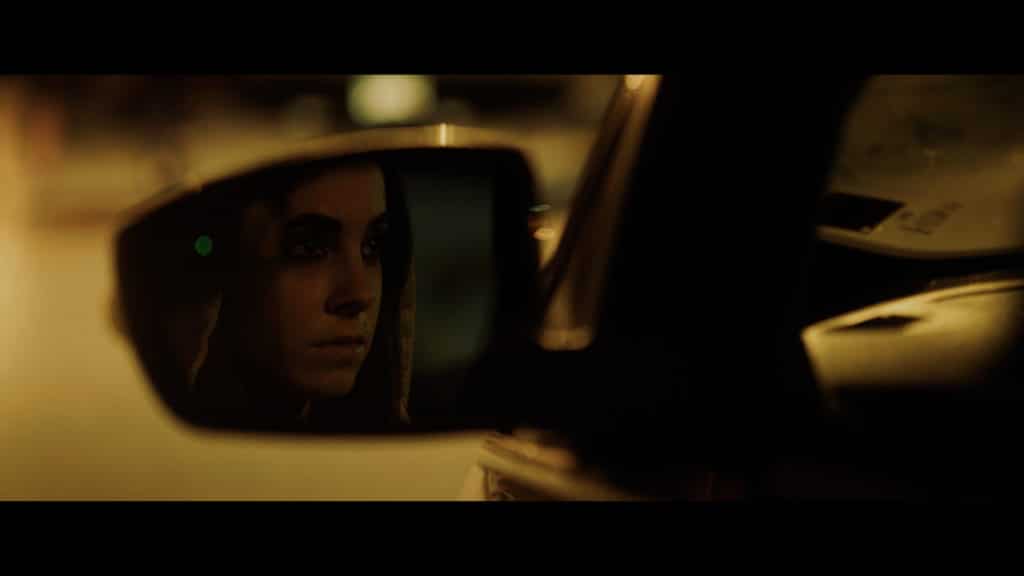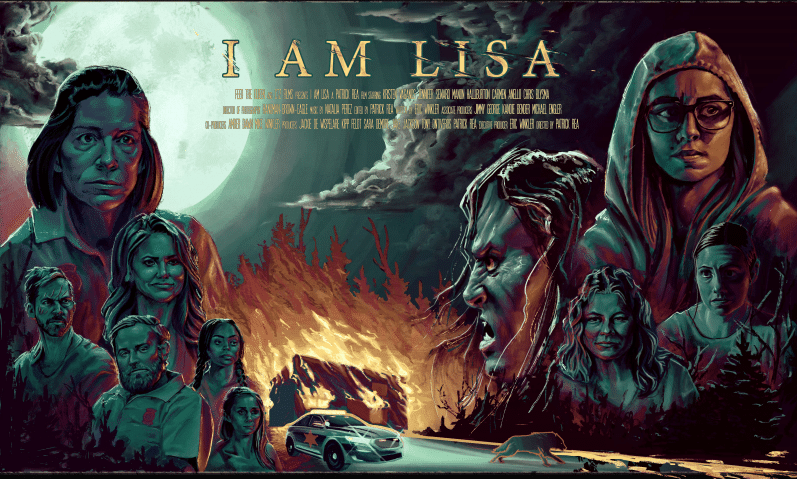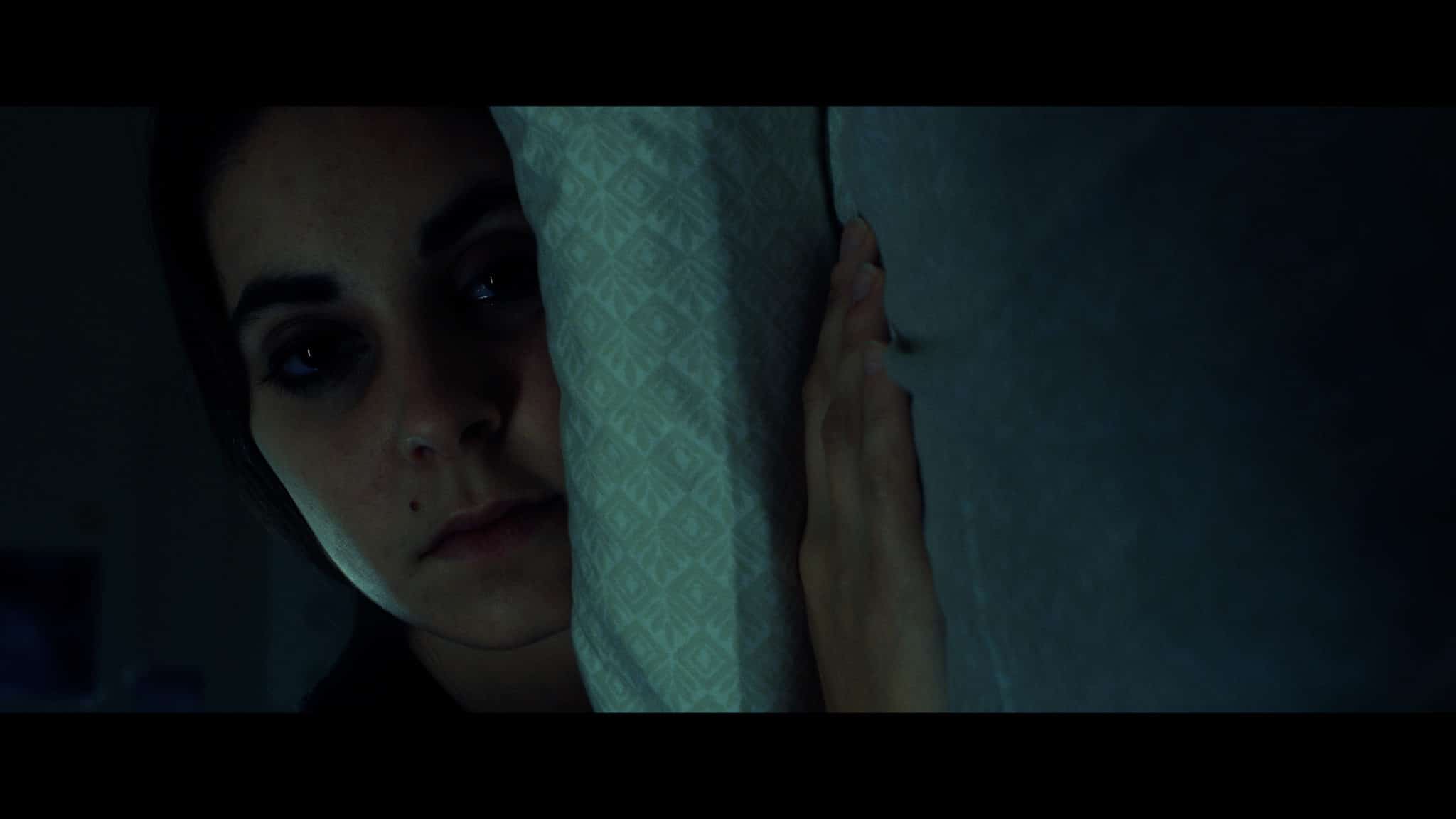
A couple of selected quotes about the nature of vengeance set us up for I Am Lisa (2020), and foreground the overall tone rather well. For a film which at times features bloody gore and violence, it takes a surprisingly sober approach to its storytelling overall, even if it quickly establishes that it’s a story which will feature lycanthropy. There have been a few werewolf horrors in past years which have used this theme to explore very human preoccupations and vulnerabilities: Late Phases, Bloodthirsty – here, werewolves aren’t often simple, straightforward monsters. Similarly, I Am Lisa is a struggle for autonomy and self-worth, just one which is shot through with a new variant on lycanthropy folklore.
After we’d made privy to a pursuit in the woods by moonlight and the shooting of a part-transformed girl by the local sheriff (Manon Halliburton), we know all is not as it seems in this small town. And, when the shy, nervous Lisa (Kristen Vaganos) returns to the same town to take care of her late grandmother’s bookstore business, her shyness and relative isolation are very quickly used against her by the local mean girls, seemingly as soon as they realise she’s back. The worst offender, Jessica (Carmen Anello) has harboured a grudge against Lisa since high school; the other girls are more hangers-on, or even only in it for a quiet life. Not that this helps Lisa. After one confrontation Jessica returns, seemingly to make friendly overtures, but this quickly morphs into a sexual assault and a threat.
After discussing her predicament with her best friend Samantha (Jennifer Seward), Lisa makes the desperate decision to report Jessica’s actions to the police. It’s a desperate decision because Jessica is part of the sprawling Huckins clan, and the matriarch of the bunch? The sheriff herself. Lisa’s attempts to file the report are inevitably incendiary, drawing the full wrath of the family down upon her; they take her out to the woods to ‘finish the lesson’, leaving her out there where – they hope – the wolves will eat what’s left of her. Needless to say perhaps, but things turn out a little differently. Some of the elements which follow are instantly recognisable; Lisa begins to change, healing rapidly, craving meat…but where the film begins to deviate from that familiarity is in its world-building. As she develops, Lisa begins to get closer to the secrets and strange phenomena associated with this place, and the role of the Huckins family in all of this.

I Am Lisa shifts from some pretty heavy signposting and referencing – a key scene from Vincent Price in The Last Man on Earth, the Arbor Demon poster clearly visible in a shot – to significantly more low-key elements and developments. The characterisation of Lisa is very subtle, with quiet hints at a back story or her motivations which do just enough. We don’t get everything spelled out in this respect, and it works. Similarly, even with an archetypal bitch like Jessica (as clearly denoted by her heavy tattoos and piercings) there are hints of more, particularly in how others gravitate towards her, but make it clear they’d rather not do so. There’s more to it, I think, than just her family’s influential and instrumental power. There are definite allusions here to the whole idea of evil flourishing when good men do nothing; there’s more to unpack about the mentality of bullies, too, and the film’s grisly and very cruel in parts; this is made more gruelling by the close focus on Lisa’s face as all of this unfolds, and what it doesn’t show is significant. Events in the film, particularly in the first twenty minutes or so, escalate very quickly before settling into a more consistent, slow-burn approach; it is quite a shift, but it makes sense overall. Only very slowly does Lisa gain a true sense of agency, overcoming her own doubts, but this is satisfying to see. In terms of plot developments, whilst I Am Lisa is more soberly-done than either of them, there is an acknowledged element of I Spit On Your Ginger Snaps to the film – it’s a vengeance flick with supernatural overtones – and even though this might sound a little mad, it feels like a Western in some places too; kinda like Hang ‘Em High (1968) only with, you know, werewolves.
I Am Lisa is a thoughtful, well-handled horror film with plenty of the 80s-homage soundtrack and practical SFX beloved of indie horror fans (though its inclusion of the beautiful acoustic version of Type O Negative’s Wolf Moon, as performed by a band called Beezlefeast, was a huge plus for me and a welcome new addition to my music library). Also, given its original spin on the werewolf mythos, there’s more than enough here for another chapter – something which I gather is a distinct possibility.
I Am Lisa (2020) is widely available to stream now.
